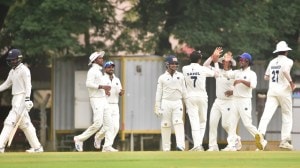Stay updated with the latest - Click here to follow us on Instagram
Setback for Rapido, Uber as SC says no to bike taxis in Delhi
Hearing appeals filed by the Delhi government, a vacation bench of Justices Aniruddha Bose and Rajesh Bindal stayed the May 26 order of the high court
 Earlier this year, the Delhi transport department had said that bike taxis are not allowed in the capital. (Representational/ File)
Earlier this year, the Delhi transport department had said that bike taxis are not allowed in the capital. (Representational/ File) The Supreme Court on Monday stayed the Delhi High Court direction permitting bike-taxi aggregators like Uber and Rapido to continue operations in the National Capital and directed that no coercive action should be taken against them till the Government of the National Capital Territory of Delhi (GNCTD) came out with policy guidelines on the matter.
Hearing appeals filed by the Delhi government, a vacation bench of Justices Aniruddha Bose and Rajesh Bindal stayed the May 26 order of the high court.
The high court order came on a plea by Rapido and Uber challenging a notification issued by the GNCTD government under the Motor Vehicles Act, 1988, disallowing bike-taxi services in the NCT.
On Monday, the Supreme Court bench noted that the state was in the process of drawing up a policy in this regard and said that in the facts and circumstances, a total stay on the notification by the high court was “unwarranted”.
The apex court asked the high court to hear the challenge to the government notification at the earliest.
The Supreme Court bench referred to section 66 and 93(1) of the 1988 Act and said that as the law stands, the services cannot be allowed without a valid permit.
Section 66 states that “no owner of a motor vehicle shall use or permit the use of the vehicle as a transport vehicle in any public place whether or not such vehicle is actually carrying any passengers or goods save in accordance with the conditions of a permit granted or countersigned by a Regional or State Transport Authority or any prescribed authority authorising him the use of the vehicle in that place in the manner in which the vehicle is being used”.
Section 93 (1) stipulates that no person shall engage himself as an aggregator unless he has obtained a licence from such authority and subject to such conditions as may be prescribed by the state government.
Senior Advocate Neeraj Kishan Kaul, appearing for the aggregators, contended that two-wheelers can be run as commercial vehicles and that there was no ban on this under the MV Act. The court, however, said that it is only an enabling provision and it cannot be allowed without permit.
The aggregators also sought to highlight the human angle and said about 35,000 drivers stand to lose their livelihood if the court disallowed them from operating. But the Supreme Court said it will hear the riders when they approach it.
The Delhi government’s counsel, meanwhile, told the court that the policy guidelines will be finalised by July 31. He added that if the aggregators and riders fall within the policy, they will be given licence immediately.







